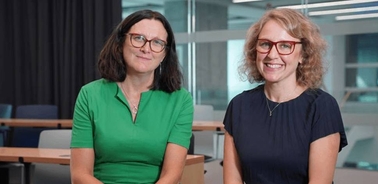Cecilia Malmström, former European Commissioner for Trade, on EU multilateralism, external competition, and enlargement

Cecilia Malmström, Senior Fellow at PIIE and Former European Commissioner for Trade, visited IE Tower and Dr Ilke Toygür interviewed her on the nature of European and Global interdependence and the Future of Europe.
On September 7, 2023, Cecilia Malmström, senior fellow at PIIE and former European Commissioner for Trade, visited IE Tower. Global Policy Center (GPC) director, Dr. Ilke Toygür, interviewed her on the nature of European and global interdependence and the Future of Europe.
They started their conversation by discussing interdependence, with the former minister of European affairs for Sweden underlining that interdependence can be positive. She stated, “The big problems the world is facing today are global, and we are interdependent in that; we cannot solve the global climate crisis, or we cannot fight poverty… without cooperation.”
However, she pointed out that interdependence has its weak point where it intersects with trade and geoeconomics. She gave the example of the world’s dependence on China for access to rare earth metals, which are crucial for the green transition.
She underlined that to lessen dependence on China, the world needs to cooperate to see where else these crucial natural resources can be sourced sustainably and without violating human rights.
Malmström also touched on the next steps forward for Europe in terms of China policy. She stated that the European Union needs to be open to cooperating with China, namely in terms of trade, the fight against climate change, and reforming the World Trade Organization.
Nonetheless, she recognized that there’s a competition element to this issue; for example, the majority of electric vehicles in the EU come from China, which has caused problems for the automotive industries of various European countries. However, Malmström feels that “building up protectionist walls is also not the way out of it,” recommending instead that the EU take an approach of openness and cooperation.
In terms of competition between the European Union and third countries, Malmström emphasized the importance of EU member states taking concrete steps toward building and improving the internal market.
In her words, the European Union “cannot punish other countries because they’ve been more innovative.” Rather, the EU should keep fighting for multilateralism while striving to improve and invest more in digitalization and technological advancement.
She also recommended nourishing and developing trade relations to manage this issue, which brings benefits for both partners while encouraging different kinds of cooperation and sparking innovation.
Next, Malmström suggested that the EU must keep fighting for a multilateral framework, stating that “Europe is built on a system where there are rules and where there is multilateralism.” She underlined that if this multilateral system fails, both EU member states and developing countries will suffer.
She recommended cooperating with third countries via international organizations, but stressed that these organizations—like the IMF, the World Bank, and the United Nations Security Council—don’t reflect the world of today.
According to her, they lack representation and influence from the “Global South”. So, the “Global North” must demonstrate a willingness to engage in discussing reforms if they want these countries to come to the table.
Finally, on the topic of enlargement, Malmström sees it as a way to approach many of the issues she and Dr. Toygür spoke about in this conversation. She stated that in the face of the Russian invasion of Ukraine, enlargement is “geopolitically, the only way forward.”
She believes that the EU must stand by its promise to invite Ukraine, Moldova and Georgia, as well as the Balkan countries and, one day, hopefully Turkey.
However, she highlighted that the European Union must make enlargement credible and make the necessary adjustments to its internal processes and budget to accommodate a growing number of member states. In her words, “we must reform ourselves, as well.”